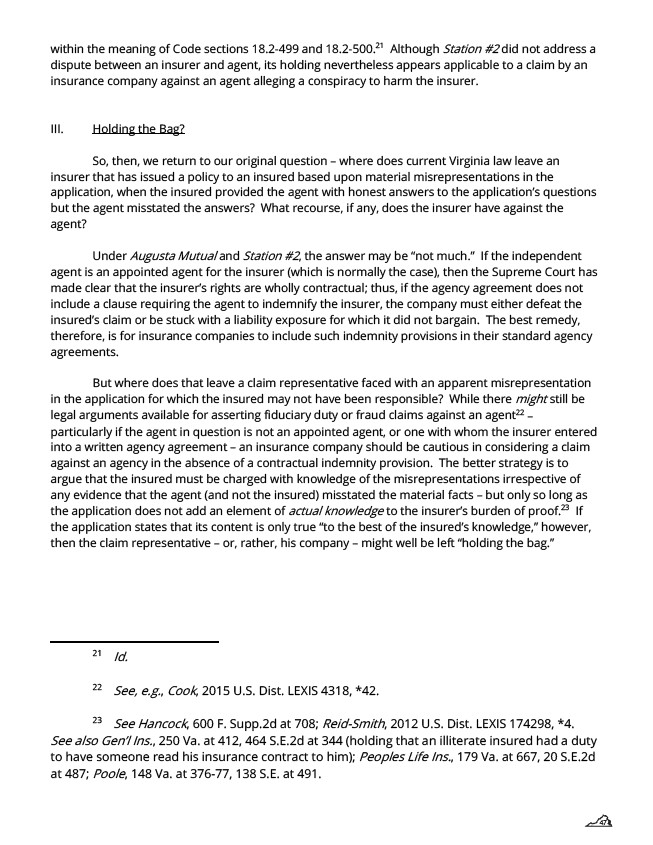
insurer that has issued a policy to an insured based upon material misrepresentations in the
application, when the insured provided the agent with honest answers to the application’s questions
but the agent misstated the answers? What recourse, if any, does the insurer have against the
agent?
agent is an appointed agent for the insurer (which is normally the case), then the Supreme Court has
made clear that the insurer’s rights are wholly contractual; thus, if the agency agreement does not
include a clause requiring the agent to indemnify the insurer, the company must either defeat the
insured’s claim or be stuck with a liability exposure for which it did not bargain. The best remedy,
therefore, is for insurance companies to include such indemnity provisions in their standard agency
agreements.
in the application for which the insured may not have been responsible? While there might still be
legal arguments available for asserting fiduciary duty or fraud claims against an agent22 –
particularly if the agent in question is not an appointed agent, or one with whom the insurer entered
into a written agency agreement – an insurance company should be cautious in considering a claim
against an agency in the absence of a contractual indemnity provision. The better strategy is to
argue that the insured must be charged with knowledge of the misrepresentations irrespective of
any evidence that the agent (and not the insured) misstated the material facts – but only so long as
the application does not add an element of actual knowledge to the insurer’s burden of proof.23 If
the application states that its content is only true “to the best of the insured’s knowledge,” however,
then the claim representative – or, rather, his company – might well be left “holding the bag.”
47
within the meaning of Code sections 18.2-499 and 18.2-500.21 Although Station #2 did not address a
dispute between an insurer and agent, its holding nevertheless appears applicable to a claim by an
insurance company against an agent alleging a conspiracy to harm the insurer.
III. Holding the Bag?
So, then, we return to our original question – where does current Virginia law leave an
Under Augusta Mutual and Station #2, the answer may be “not much.” If the independent
But where does that leave a claim representative faced with an apparent misrepresentation
- 6 -
21 Id.
22 See, e.g., Cook, 2015 U.S. Dist. LEXIS 4318, *42.
23 See Hancock, 600 F. Supp.2d at 708; Reid-Smith, 2012 U.S. Dist. LEXIS 174298, *4.
See also Gen’l Ins., 250 Va. at 412, 464 S.E.2d at 344 (holding that an illiterate insured had a duty
to have someone read his insurance contract to him); Peoples Life Ins., 179 Va. at 667, 20 S.E.2d
at 487; Poole, 148 Va. at 376-77, 138 S.E. at 491.